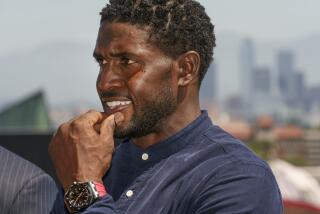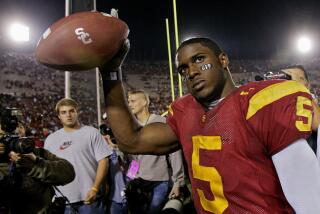Bush Also Had What It Took to Win at Yale
- Share via
Defense, a major part of his presidential platform, always interested George Bush. He was a first baseman with a deft touch during two seasons when Yale University had the second-best college baseball team in the country.
And now, the man elected to become the 42nd president of the United States, steps up to the plate with more power than any player in the world.
It’s a different perspective for Bush -- baseball as opposed to politics -- and his old coach, Ethan Allen, who spent 13 years in the major leagues before he graduated to Yale. Allen reflected the other day on the performance of his one-time team captain. Bush didn’t knock down any fences, but he was a highly respected contributor to the Yale teams that went 35-17-2 during the 1947 and 1948 seasons.
With Bush at first base, Yale played in the first National Collegiate Athletic Assn. baseball championship, losing to the University of California in 1947. It advanced to the finals the next year, also, but fell to USC.
Allen said he liked Bush as an individual but didn’t vote the Bush ticket in the presidential election. Obviously, the coach isn’t influenced by old school ties.
“An excellent first baseman and a pretty fair hitter,” was the way Allen remembered Bush. In a telephone conversation from his Chapel Hill, N.C., home, he said, “I remember recommending him to a selection board of coaches for a place on a college all-star team. They didn’t pay any attention to me, but he deserved the consideration. I think they picked some outfielder instead who couldn’t get out of his own way.”
When Bush played, Ivy League baseball was highly competitive and considered among the best in the country. Allen, who describes himself as “69 going on 84,” says there was an afternoon when Yale played North Carolina State and Bush had a highly productive day, handling himself smoothly in the field, plus hitting a double and a triple.
“The scouts came out of the stands and wanted to talk to him, but that didn’t mean he was a big league prospect,” Allen said. “I used him at first base because, after trying several others, I realized we needed his defense.”
Actually, a look at Bush’s batting average shows he hit more like Michael Dukakis, or rather a utility infielder, than a first baseman. In 1947, Bush batted .239, and the next year he improved to .264. He had one home run each season. Playing against Navy and Maryland in four games over those two seasons, he went for the collar -- 0 for 11.
He batted seventh in the lineup, which meant he wasn’t expected to provide the long ball. He had fielding marks of .974 and .990. At 6-feet, 170 pounds, Bush was a finesse first baseman who threw left-handed and batted right.
“That kind of an arrangement might have made him all mixed up,” said Allen, because baseball purists generally have trouble accepting such a combination. They’ll more readily go for the reverse -- a right-handed thrower who swings from the other side.
“I think back to the time when we were going to go to West Point to play Army,” said Allen, “and I wouldn’t let his wife, Barbara, who was pregnant, travel with us. I was afraid she might have the baby on the team bus.”
Allen, a character in his own right, says he was invited to Bush’s inauguration as vice president eight years ago. But because of his advancing age, Allen didn’t make the trip. He always receives a Christmas card from his former first baseman and hails him as a “good man because, after all, he was the captain of our team.”
In the post-World War II years, Allen realized that college players were older and, thus, had a different outlook on the sports they were playing.
“They were really serious in how they approached the game and also in their school work. He won’t be surprised to learn I didn’t vote for him. He knows that. I’m an ex-Republican. I remember when George became the head of the Central Intelligence Agency and one of his former teammates called from Wisconsin to tell me about the appointment. I told him if George was able to understand my signals, then I would guess he’d be capable of spying.”
When Bush was a senior at Yale, a younger teammate was Dick Tettelbach, who later played for the New York Yankees and Washington Senators. Tettelbach, in discussing Bush, says the most famous first baseman to come out of the Ivy League since Lou Gehrig was “a guy we really respected as a leader.”
But 40 years after Bush put away his first baseman’s mitt and had achieved the highest office in the land, what else is Tettelbach going to say?
If there’s a moral to the story, a lasting lesson from the dugout, then don’t offer scorn to a career .251 hitter at Yale. He might grow up to be president of the United States.
More to Read
Go beyond the scoreboard
Get the latest on L.A.'s teams in the daily Sports Report newsletter.
You may occasionally receive promotional content from the Los Angeles Times.










